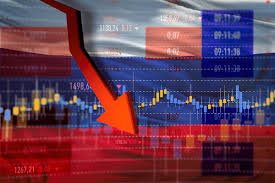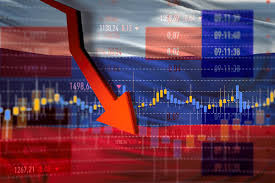
Russia's invasion of Ukraine on February 24 triggered broad sanctions, ripping the country out of the global financial fabric and sending its economy into a tailspin.
After a month, Russia's currency has lost a significant portion of its value, and its bonds and stocks have been removed from indexes. Its people are suffering from economic hardship that will most likely persist for years.
According to the World Bank, Russia's economy was the 11th largest in the world in 2020. According to Jim O'Neill, the former Goldman Sachs economist who invented the BRIC term to identify the four major rising economies of Brazil, Russia, India, and China, it may rank no higher than No. 15 by the end of this year, based on the end-of-February rouble exchange rate.
Recession appears to be unavoidable. The central bank polled economists, who anticipated a 8 per cent contraction this year and inflation of 20 per cent.
Forecasts from economists outside of Russia are even more pessimistic. According to the Institute of International Finance, the economy would fall by 15 per cent in 2022, followed by a 3 per cent contraction in 2023.
"Altogether, our projections mean that current developments are set to wipe out the economic gains of roughly fifteen years," the IIF said in a note.
Elvira Nabiullina, the governor of the Central Bank of Latvia, has reduced inflation from 17 per cent in 2015 to slightly over 2 per cent in early 2018. As pricing pressures grew in the months following the pandemic, she defied businessmen by hiking interest rates for the eighth time in a row.
In 2014-2015, Nabiullina also rebuffed proposals for capital controls to prevent withdrawals following the annexation of Crimea.
But those accomplishments have been shattered in less than a month.
Annual price rise has accelerated to 14.5 per cent and is expected to exceed 20 per cent, which is five times the aim. Inflation estimates for the coming year are above 18 per cent, an 11-year high.
While some of this is due to panic buying, rouble weakening may keep price pressures elevated.
With Russia's reserves warchest stranded overseas, Nabiullina was compelled to more than quadruple interest rates and impose capital controls on February 28. The central bank currently anticipates that inflation will return to target only in 2024.
Sanctions are driving index providers to remove Russia from benchmarks that investors use to direct billions of dollars into emerging markets.
JPMorgan and MSCI, for example, have stated that Russia will be removed from their bond and stock indexes, respectively.
Russia's status in these indices had already suffered after the first round of Western sanctions in 2014, and then again in 2018, following the poisoning of a former Russian spy in the United Kingdom and investigations into alleged Russian intervention in the 2016 U.S. elections.
Almost all major index providers will reduce Russia's weighting to zero on March 31.
Russian military surged into Ukraine with a coveted "investment grade" credit rating from the three major agencies, S&P Global, Moody's, and Fitch.
As a result, it was able to borrow quite cheaply, and a national debt default appeared to be a long-term possibility.
Russia's credit rating has been slashed by the most significant amount in four weeks. It is presently at the bottom of the ratings ladder, signalling an impending default.
The rouble's one-year average exchange rate was 74 per dollar a month ago. Trading on many platforms revealed the expected abundance of liquidity and narrow bid/ask spreads for a key emerging market currency.
Everything has changed. With the central bank's hard currency reserves depleted, the rouble fell to historic lows of more than 120 per dollar domestically. It plummeted as low as 160 to the US dollar in offshore transactions.
Pricing the rouble has grown chaotic as liquidity has dried up and bid/ask spreads have widened. The exchange rate has failed to strike a balance between on- and offshore markets.
(Source:www.reuters,com)
After a month, Russia's currency has lost a significant portion of its value, and its bonds and stocks have been removed from indexes. Its people are suffering from economic hardship that will most likely persist for years.
According to the World Bank, Russia's economy was the 11th largest in the world in 2020. According to Jim O'Neill, the former Goldman Sachs economist who invented the BRIC term to identify the four major rising economies of Brazil, Russia, India, and China, it may rank no higher than No. 15 by the end of this year, based on the end-of-February rouble exchange rate.
Recession appears to be unavoidable. The central bank polled economists, who anticipated a 8 per cent contraction this year and inflation of 20 per cent.
Forecasts from economists outside of Russia are even more pessimistic. According to the Institute of International Finance, the economy would fall by 15 per cent in 2022, followed by a 3 per cent contraction in 2023.
"Altogether, our projections mean that current developments are set to wipe out the economic gains of roughly fifteen years," the IIF said in a note.
Elvira Nabiullina, the governor of the Central Bank of Latvia, has reduced inflation from 17 per cent in 2015 to slightly over 2 per cent in early 2018. As pricing pressures grew in the months following the pandemic, she defied businessmen by hiking interest rates for the eighth time in a row.
In 2014-2015, Nabiullina also rebuffed proposals for capital controls to prevent withdrawals following the annexation of Crimea.
But those accomplishments have been shattered in less than a month.
Annual price rise has accelerated to 14.5 per cent and is expected to exceed 20 per cent, which is five times the aim. Inflation estimates for the coming year are above 18 per cent, an 11-year high.
While some of this is due to panic buying, rouble weakening may keep price pressures elevated.
With Russia's reserves warchest stranded overseas, Nabiullina was compelled to more than quadruple interest rates and impose capital controls on February 28. The central bank currently anticipates that inflation will return to target only in 2024.
Sanctions are driving index providers to remove Russia from benchmarks that investors use to direct billions of dollars into emerging markets.
JPMorgan and MSCI, for example, have stated that Russia will be removed from their bond and stock indexes, respectively.
Russia's status in these indices had already suffered after the first round of Western sanctions in 2014, and then again in 2018, following the poisoning of a former Russian spy in the United Kingdom and investigations into alleged Russian intervention in the 2016 U.S. elections.
Almost all major index providers will reduce Russia's weighting to zero on March 31.
Russian military surged into Ukraine with a coveted "investment grade" credit rating from the three major agencies, S&P Global, Moody's, and Fitch.
As a result, it was able to borrow quite cheaply, and a national debt default appeared to be a long-term possibility.
Russia's credit rating has been slashed by the most significant amount in four weeks. It is presently at the bottom of the ratings ladder, signalling an impending default.
The rouble's one-year average exchange rate was 74 per dollar a month ago. Trading on many platforms revealed the expected abundance of liquidity and narrow bid/ask spreads for a key emerging market currency.
Everything has changed. With the central bank's hard currency reserves depleted, the rouble fell to historic lows of more than 120 per dollar domestically. It plummeted as low as 160 to the US dollar in offshore transactions.
Pricing the rouble has grown chaotic as liquidity has dried up and bid/ask spreads have widened. The exchange rate has failed to strike a balance between on- and offshore markets.
(Source:www.reuters,com)





